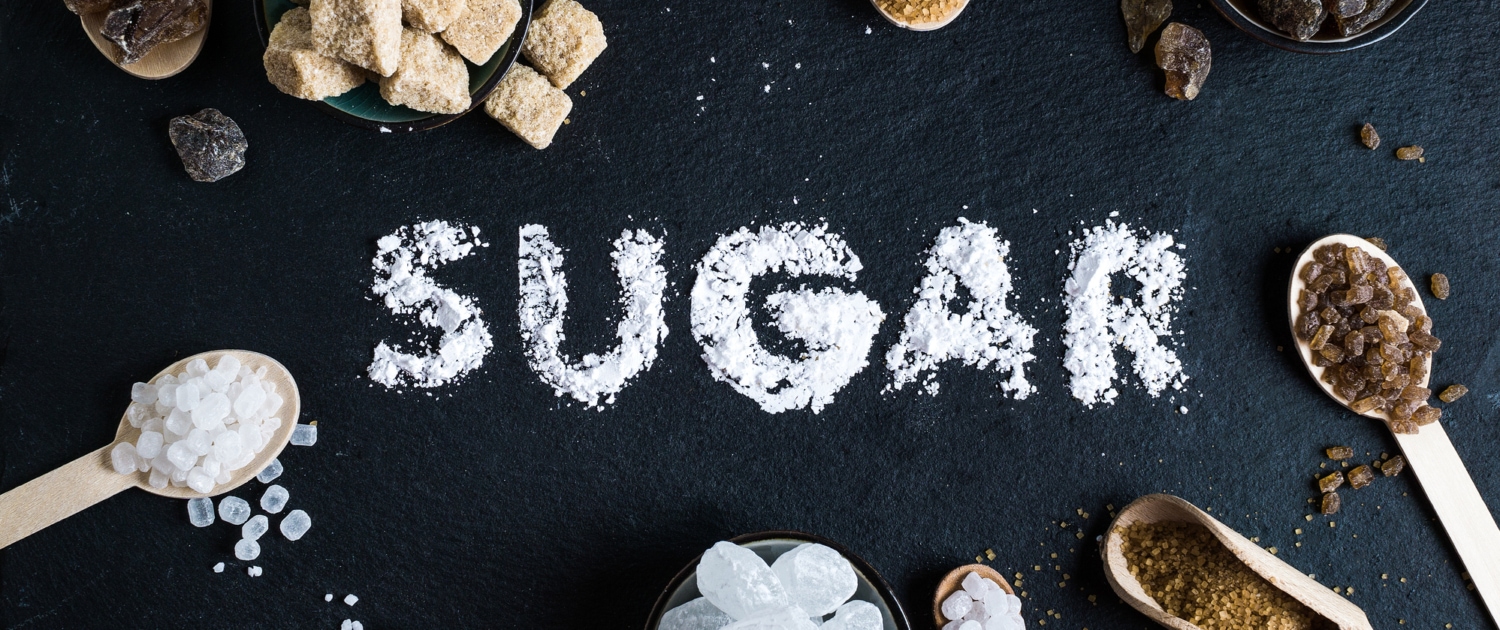Natural Coffee Sweeteners
– Best Natural Sugar Substitutes For You –
Coffee is one of the most popular and consumed beverages in the world.
Sugar is at least equally popular in many households.
Often, these two food components go hand in hand. Many coffee lovers cannot imagine their daily cup of coffee without some type of sugar in it.
Unfortunately and as great as sugar may taste. Especially in higher amounts, it is not exactly helpful for a healthy diet and overall lifestyle.
Therefore, many of us try to cut down on sugar. Or, they try quitting refined sugar at all.
However, this can become quite a tough challenge.
But given how incredibly harmful sugar can be for some of us. It is definitely worth the try and effort.
Luckily, there are quite a few natural coffee sweeteners for us to try out there. These are some of the best natural sugar substitutes and certainly good for our health.
They do not just taste good. But, these natural coffee sweeteners are low in calories and fructose as well.
Here are 4 natural coffee sweeteners for you to consider.
On top, we will also have a look at coconut sugar, honey, maple syrup and molasses.
-
Stevia
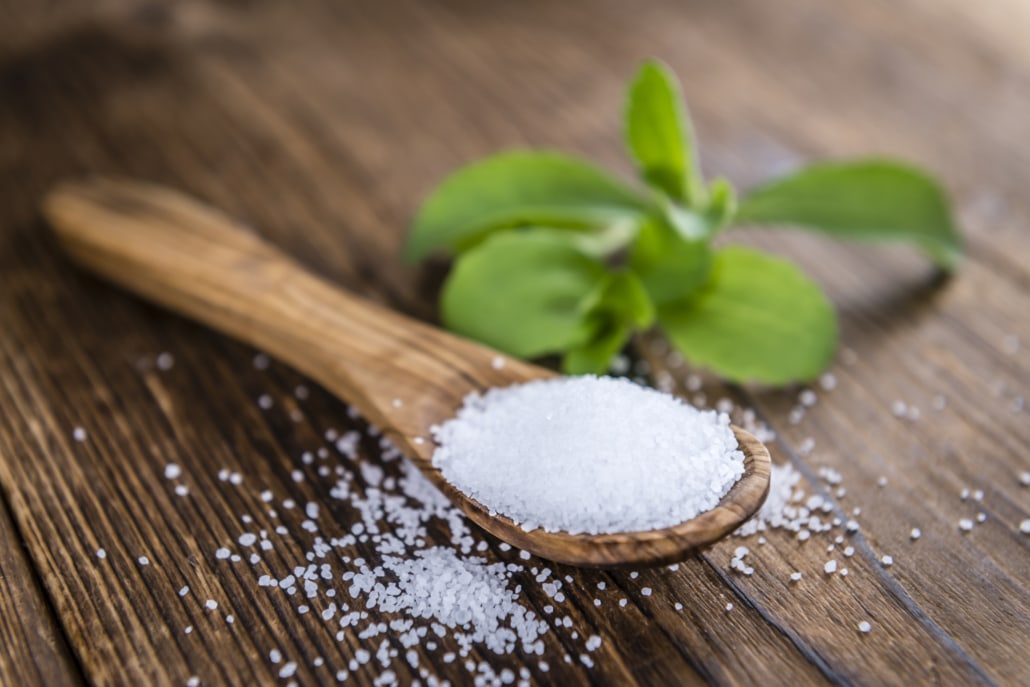
Many of you have probably heard of stevia already.
It is a very popular low-calorie sweetener. The natural sugar substitute is extracted from the leaves of a plant called Stevia rebaudiana.
Especially in South America, this plant has been utilized for centuries already. People grew it for sweetness and medicinal purposes.
You can find several compounds in the stevia leaves. Surely, the main ones are Stevioside and Rebaudioside A.
Quite remarkably, both natural compounds are hundreds of times sweeter than sugar. This is, if you compare gram for gram.
Consequently, stevia is very sweet but has virtually no calories at all.
In addition, various studies link stevia to several health benefits.
- Stevia may lower the blood pressure in people with hypertension by 6-14%. But, it has no significant effect on people’s blood pressure that is normal or mildly elevated.
- Furthermore, the natural coffee sweetener may also lower blood sugar levels in people with diabetes.
- Other studies show, that stevia can improve our insulin sensitivity. It can also reduce oxidized LDL cholesterol. And, the compounds may reduce plaque built up in the arteries, as well.
As a result, if you need to sweeten up something. Stevia might actually be the healthiest choice for you.
However, some people are not really fond of the taste of stevia. Not everyone likes the flavor it adds to food such as coffee.
Luckily, the flavor depends on the brand and product you are using. You just need to experiment a little. Until you have found the type of stevia you like the most.
It’s definitely worth a try.
-
Erythritol – Natural Coffee Sweeteners
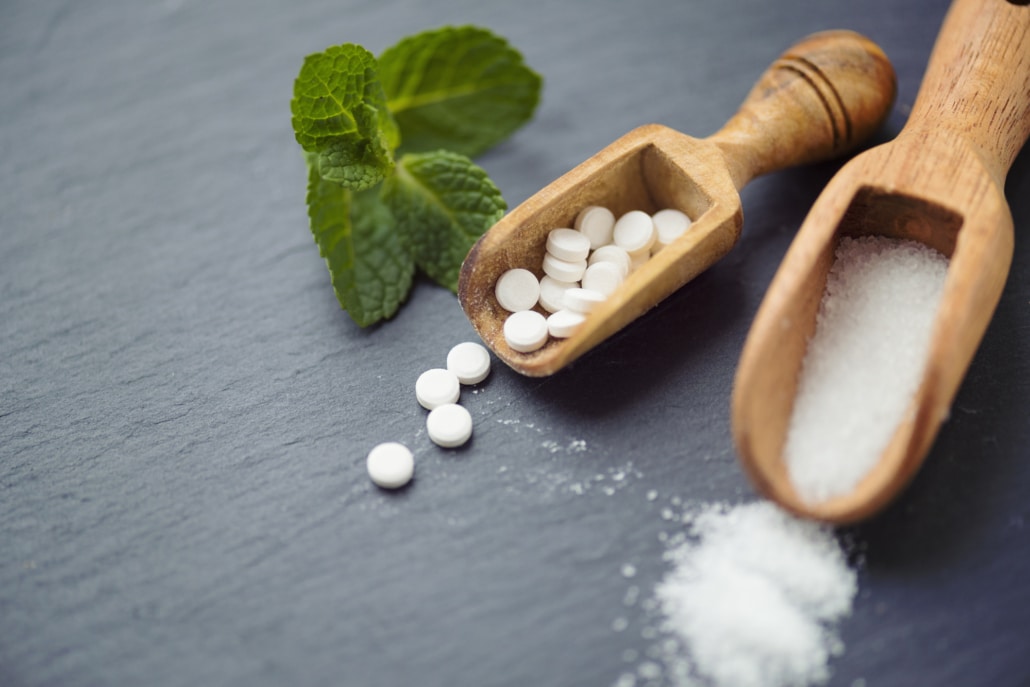
Our next candidate for you is another low-calorie sweetener.
In short, Erythritol is a sugar alcohol. You can find this natural sugar substitute in certain types of fruit.
However, the product itself is most likely made via an industrial process. Normally, you can find it as a powdery product in nearby shops.
Commonly, this sweetener contains 0.24 calories per gram. This is about 6% of the calories in an equal amount of sugar, with 70% of the sweetness.
There are also a few handy benefits worth mentioning.
For example, it does not spike blood sugar or insulin levels. On top, Erythritol has no significant effect on blood lipids like cholesterol or triglycerides.
In general, studies suggest that Erythritol is very safe. However, please be careful how much you are consuming. Limit your intake and don’t necessarily overdo it.
As with other sugar alcohols, it may cause digestive issues with higher amounts.
Moreover, Erythritol typically tastes very similar to sugar. Additionally, you might experience a mild aftertaste as well.
Overall, researchers do not associate any real health benefits with it. But it also does not appear to be harmful in any notable way.
In comparison, people usually tolerate Erythritol better than most other sugar alcohols.
Have you maybe tried it already? If yes, let us know what you are thinking about this natural coffee sweetener.
-
Xylitol – Best Natural Sugar Substitutes
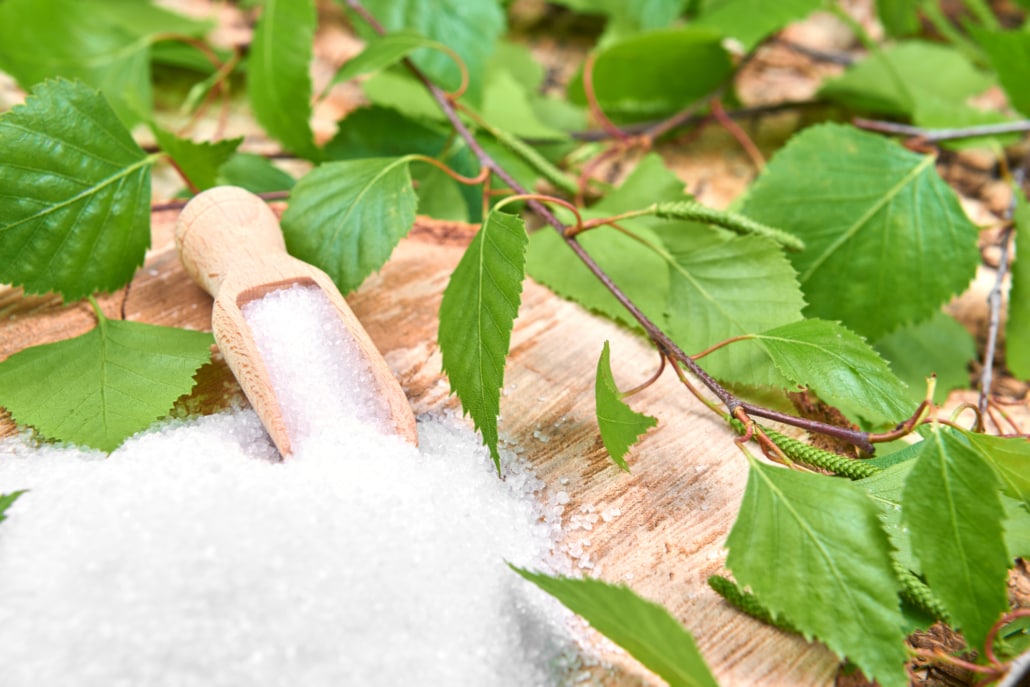
Same as the previous one, also Xylitol is a sugar alcohol.
It has a very similar sweetness to regular sugar as well. And, Xylitol contains 2.4 calories per gram. This translates into about two-thirds of the caloric value of sugar.
The natural coffee sweetener is thought to have some benefits for our dental health, in particular. Because, it may reduce the risk of cavities and dental decay.
Additionally, there are studies suggesting that it also potentially supports our bone density. Hence, it can help to prevent diseases like osteoporosis.
Furthermore, Xylitol does not raise our blood sugar or insulin levels. However, as is the case with other sugar alcohols as well. At high doses, it can cause digestive side effects.
Last but certainly not least for any dog lovers or owners.
If you have a dog at home. It is highly recommendable to keep Xylitol out of their reach. The sugar alcohol is particularly highly toxic to dogs.
After eating, they tend to vomit a lot. Unfortunately, this can lead too serious conditions. Therefore, you might want to keep it away.
Humans reportedly do not show the same symptoms and reactions.
-
Yacon Syrup – Natural Coffee Sweeteners
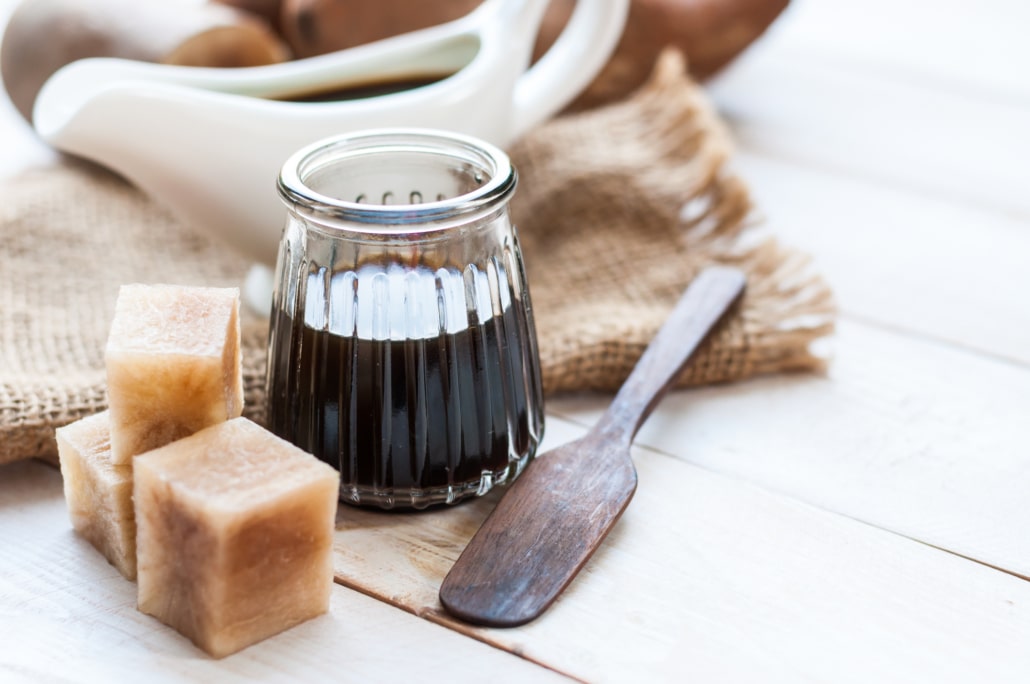
The Yacon syrup is another unique sweetener.
Farmers harvest the natural coffee sweetener from the yacon plant. Originally, the plant grows in the Andes in South America.
Yacon syrup is still relatively new on the market. Recently, it has especially become popular as a weight loss supplement.
For example, one interesting study found that it caused significant weight loss in overweight women.
Furthermore, the natural sweetener is very high in fructooligosaccharides. The compound mainly functions as soluble fibers. They ‘feed’ good bacteria in the intestine.
Yacon syrup can also help against constipation. And, it also has various, other health benefits. This is mainly due to the high amount of soluble fiber.
However and again, I would also like to make you aware not to eat too much at a time. Because, it can cause some digestive problems as well then.
Generally, people describe the taste of yacon syrup a bit like an apple but sweeter.
Extras
What about honey, coconut, molasses or maple syrup?
Of course, these are also natural sweeteners. And, they all are very popular around the world.
Health-conscious people often use them in place of regular sugar.
In general, these natural sugar substitutes may contain a few more nutrients than normal sugar. And, your body will still be metabolized and energized the same way.
Additionally, it is important to note that these natural sweeteners are still forms of sugar though. This makes them slightly ‘less harmful’ than regular sugar.
-
Coconut Sugar
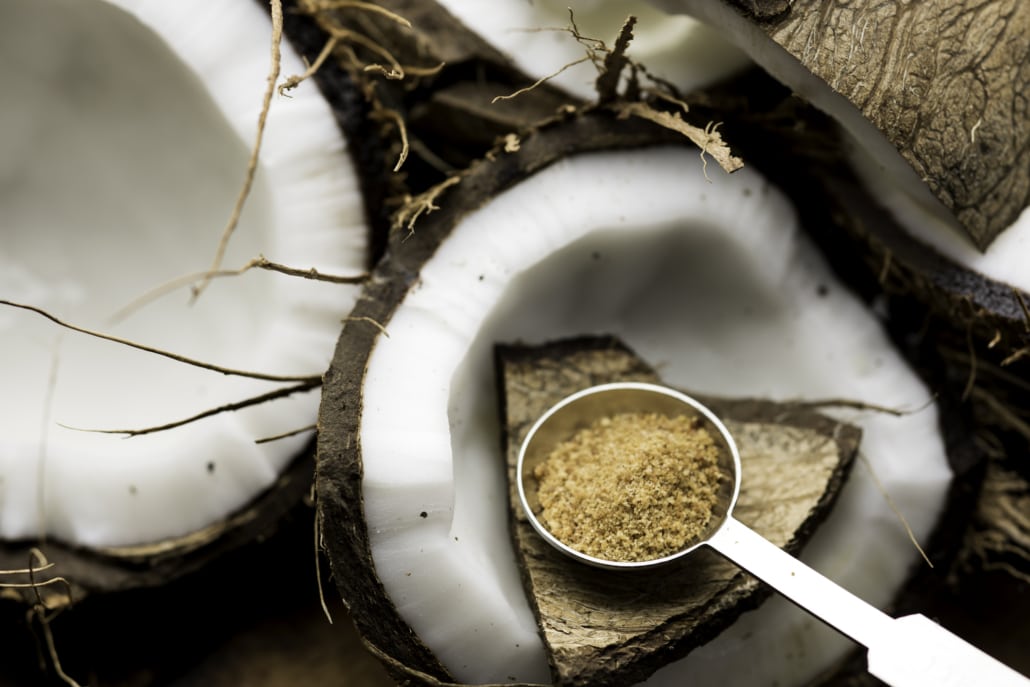
Traditionally, farmers extract the infamous coconut sugar from the sap, or tree liquid, of the coconut palm tree.
Commonly, coconut sugar is also called coconut palm sugar.
This natural coffee sweetener contains a few nutrients. These include iron, zinc, calcium, potassium, as well as antioxidants.
It has a lower glycemic index than sugar. The index represents the relative rise in the blood glucose level two hours after consuming that food.
This may be partly due to the insulin content of coconut sugar.
In general, insulin is a type of soluble fiber. Studies show that it slows down our digestion. At the same time, it increases a feeling of fullness. And, it feeds the healthy bacteria in our gut.
Despite this, coconut is however still very high in calories. The natural sweetener contains about the same number of calories per serving as regular sugar.
Furthermore, coconut sugar is also very high in fructose. This is the main reason why regular sugar is so unhealthy in the first place.
To summarize, we can say that coconut sugar is very similar to regular table sugar.
Therefore, we should also rather use it in a moderate and limited way.
-
Honey
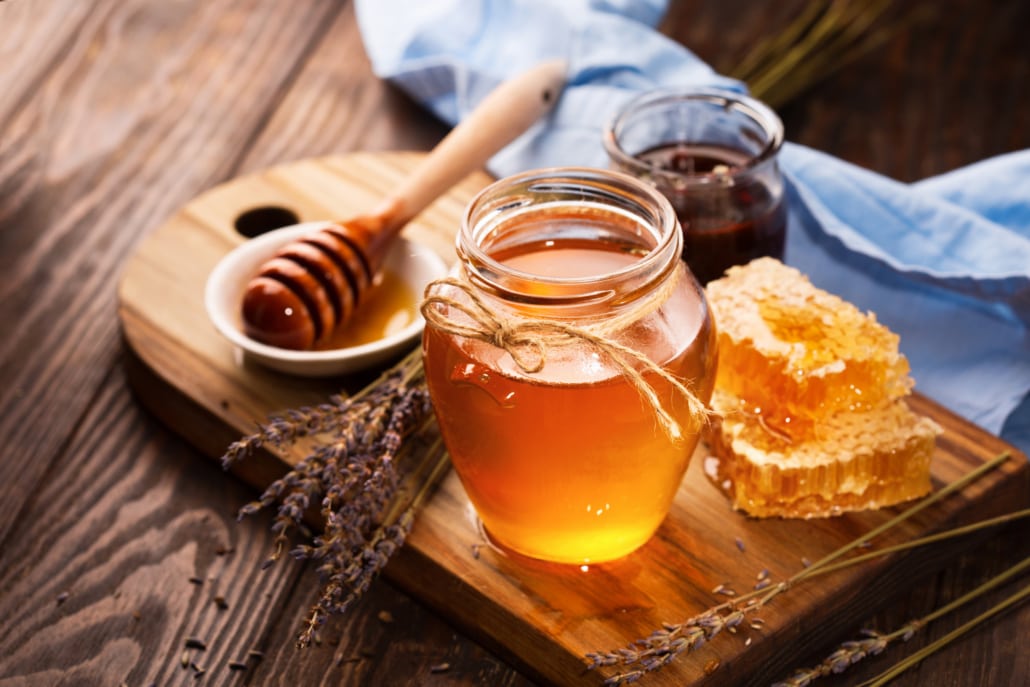
Who doesn’t love honey?
At least, I certainly do. Just by the looks, this natural sweetener looks deliciously appealing already.
Typically, honey is a thick and golden liquid. Of course, it is produced by honey bees.
It contains smaller amounts of vitamins and minerals, as well as antioxidants.
Especially, the phenolic acids and flavonoids in honey are responsible for its antioxidant activity. This can help to prevent diabetes, inflammation, heart disease and cancer, for example.
Throughout recent years, quite a lot of studies tried to establish clear links between honey and weight loss.
However, there is no clear scientific picture or opinion on this subject yet. More research still needs to be done here, first.
Yes, many reports suggest that honey has various health benefits, indeed.
However, the natural sweetener also still contains fructose. And, this can potentially lead to a number of health problems.
After all, honey is still sugar.
And therefore, it is not completely harmless. A moderate consumption of honey is most likely the best way, too.
-
Maple Syrup
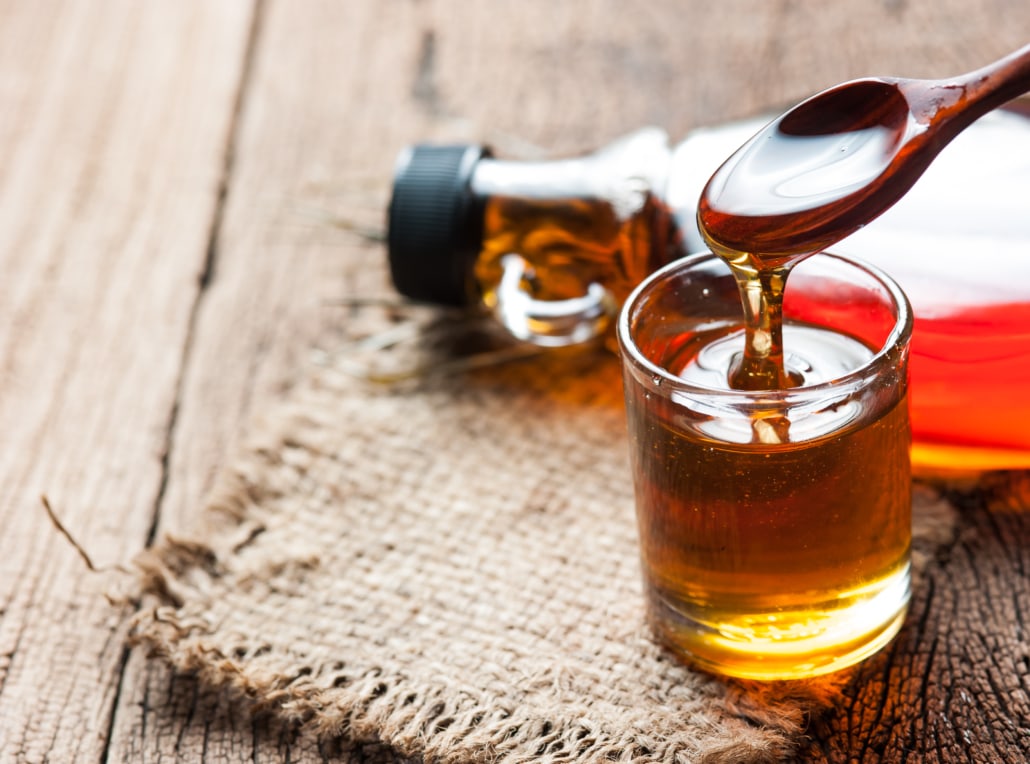
Many of us, who don’t prefer honey, choose maple syrup as alternative instead.
But is it actually that much different or better?
In general, maple syrup is a thick and sugary liquid. Producers usually make it by cooking down the sap, or tree liquid, of maple trees.
The natural sweetener contains a decent amount of minerals. For example, these include iron, calcium, potassium, zinc, and manganese.
Compared to honey, it also contains more antioxidants.
Despite some overall, beneficial nutrients and antioxidants. Maple syrup is still very high in sugar as well, however.
It has a slightly lower glycemic index than regular sugar, for example. Therefore, the sweet liquid may not raise blood sugar levels as quickly as sugar does. But, it will still raise them nonetheless.
In summary, you can actually put coconut sugar, honey and maple syrup into the same category.
They are all a slightly better option than regular sugar. However, you should still consume them in moderation and not eat too much at a time.
-
Molasses
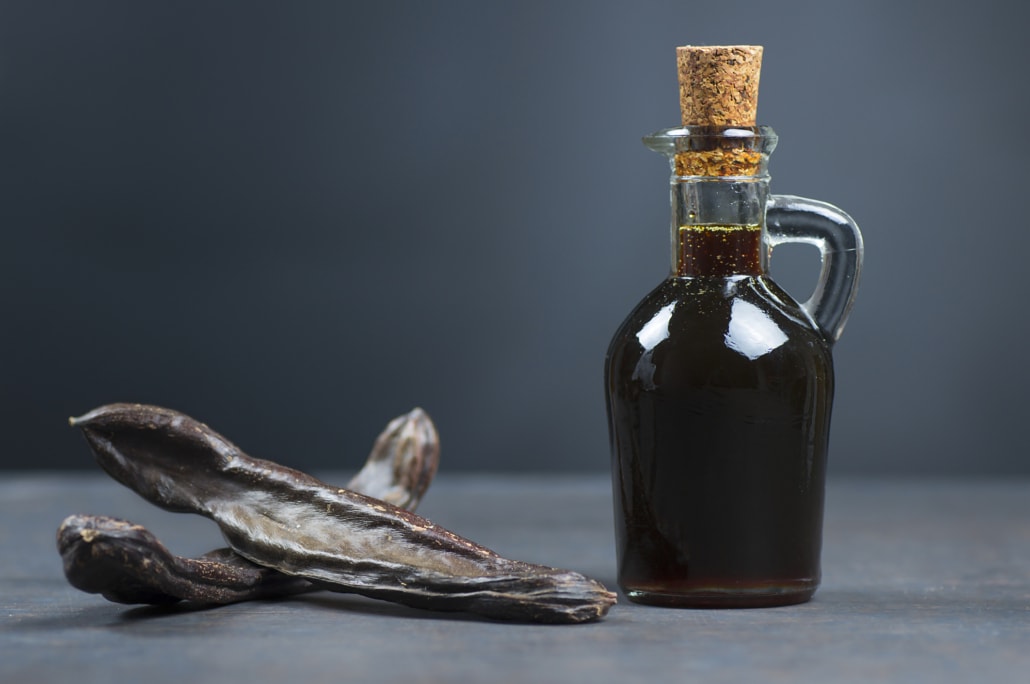
Here comes the last optional and natural coffee sweetener.
Many people have maybe heard of it already. But only few regularly use it.
Naturally, molasses is a sweet and brown liquid. It has a thick, syrup-like consistency.
People typically make it from boiling down sugar cane or sugar beet juice.
Furthermore, molasses contains a number of vitamins, minerals, as well as several antioxidants.
In addition, the natural sweetener is high in iron, potassium and calcium. Due to these contents, it may support bone and heart health.
Overall, molasses can be a fine replacement for regular sugar.
However, it is still a form of sugar, too. Therefore, I am advising you the same as I already did for the previous ones.
Please don’t excessively overdo it. But maybe try to limit your consumption of it instead.
Your overall well-being will greatly appreciate it.
The Bottom Line
At the end of day, it all depends on each one of us.
It is the way we treat our bodies and minds. And, what kind of preferences we do have in our own daily lives.

Coffee alone has many great health benefits. Some people even claim that it makes us happier and live longer.
It is rather the additional coffee ingredients and overall consumption that may cause issues.
Healthy people can eat sugar in small amounts without any harm.
But higher amounts can eventually become critical for any of us.
If you don’t like to entirely go without regular sugar. Maybe you can at least substitute it with one these options from time to time.
As we all know, especially coffee drinkers love to use all sorts of sweeteners. Hopefully, some of these natural coffee sweeteners are worth a thought for you.
So, how about you?
How do you usually sweeten up your coffee? Or, do you prefer it black?
What kind of sweeteners do you usually use and how much? Have you tried any of the above already?
Feel free to share your coffee and sugar experiences with us.
Until then, stay healthy, safe and properly caffeinated.
Cheers!
Related Posts
 https://www.siamhillscoffee.com/wp-content/uploads/What-is-Caffeine-–-Is-it-Good-or-Bad-for-Your-Health-–-1.jpg
1414
2121
Siamhillscoffee
https://www.siamhillscoffee.com/wp-content/uploads/coffee-logo.png
Siamhillscoffee2021-04-25 11:19:442021-04-25 11:19:44What is Caffeine? – Is it Good or Bad for Your Health –
https://www.siamhillscoffee.com/wp-content/uploads/What-is-Caffeine-–-Is-it-Good-or-Bad-for-Your-Health-–-1.jpg
1414
2121
Siamhillscoffee
https://www.siamhillscoffee.com/wp-content/uploads/coffee-logo.png
Siamhillscoffee2021-04-25 11:19:442021-04-25 11:19:44What is Caffeine? – Is it Good or Bad for Your Health – https://www.siamhillscoffee.com/wp-content/uploads/How-Much-Caffeine-is-in-a-Cup-of-Coffee-All-You-Need-to-Know-–-1.jpg
1414
2121
Siamhillscoffee
https://www.siamhillscoffee.com/wp-content/uploads/coffee-logo.png
Siamhillscoffee2021-04-25 11:10:082021-04-25 11:10:08How Much Caffeine is in a Cup of Coffee – All You Need to Know –
https://www.siamhillscoffee.com/wp-content/uploads/How-Much-Caffeine-is-in-a-Cup-of-Coffee-All-You-Need-to-Know-–-1.jpg
1414
2121
Siamhillscoffee
https://www.siamhillscoffee.com/wp-content/uploads/coffee-logo.png
Siamhillscoffee2021-04-25 11:10:082021-04-25 11:10:08How Much Caffeine is in a Cup of Coffee – All You Need to Know – https://www.siamhillscoffee.com/wp-content/uploads/Coffee-and-Antioxidants-A-Complete-Overview-–-1.jpg
1413
2122
Siamhillscoffee
https://www.siamhillscoffee.com/wp-content/uploads/coffee-logo.png
Siamhillscoffee2021-03-14 03:52:072021-03-14 03:52:07Coffee and Antioxidants – A Complete Overview –
https://www.siamhillscoffee.com/wp-content/uploads/Coffee-and-Antioxidants-A-Complete-Overview-–-1.jpg
1413
2122
Siamhillscoffee
https://www.siamhillscoffee.com/wp-content/uploads/coffee-logo.png
Siamhillscoffee2021-03-14 03:52:072021-03-14 03:52:07Coffee and Antioxidants – A Complete Overview – https://www.siamhillscoffee.com/wp-content/uploads/Caffeine-Overdose-–-A-Review-on-How-Much-is-Too-Much-–-1.jpg
1414
2121
Siamhillscoffee
https://www.siamhillscoffee.com/wp-content/uploads/coffee-logo.png
Siamhillscoffee2021-03-14 03:44:312021-03-14 03:44:31Caffeine Overdose – A Review on How Much is Too Much –
https://www.siamhillscoffee.com/wp-content/uploads/Caffeine-Overdose-–-A-Review-on-How-Much-is-Too-Much-–-1.jpg
1414
2121
Siamhillscoffee
https://www.siamhillscoffee.com/wp-content/uploads/coffee-logo.png
Siamhillscoffee2021-03-14 03:44:312021-03-14 03:44:31Caffeine Overdose – A Review on How Much is Too Much – https://www.siamhillscoffee.com/wp-content/uploads/Lose-Weight-with-Coffee-–-Does-Coffee-Help-Burning-Fat-–-1.jpg
1412
2122
Siamhillscoffee
https://www.siamhillscoffee.com/wp-content/uploads/coffee-logo.png
Siamhillscoffee2021-03-14 03:34:242021-03-14 03:34:24Lose Weight with Coffee – Does Coffee Help Burning Fat? –
https://www.siamhillscoffee.com/wp-content/uploads/Lose-Weight-with-Coffee-–-Does-Coffee-Help-Burning-Fat-–-1.jpg
1412
2122
Siamhillscoffee
https://www.siamhillscoffee.com/wp-content/uploads/coffee-logo.png
Siamhillscoffee2021-03-14 03:34:242021-03-14 03:34:24Lose Weight with Coffee – Does Coffee Help Burning Fat? –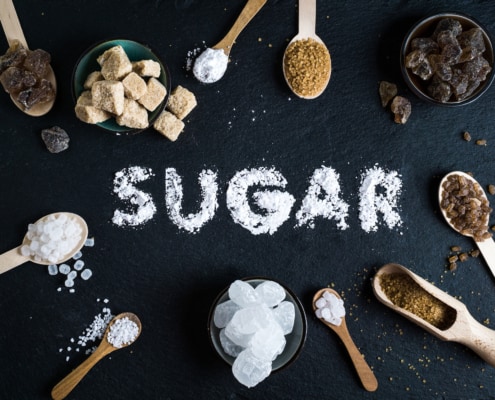 https://www.siamhillscoffee.com/wp-content/uploads/Natural-Coffee-Sweeteners-–-Best-Natural-Sugar-Substitutes-For-You-–-1.jpg
1502
1997
Siamhillscoffee
https://www.siamhillscoffee.com/wp-content/uploads/coffee-logo.png
Siamhillscoffee2021-02-20 05:43:182021-03-03 07:41:19Natural Coffee Sweeteners – Best Natural Sugar Substitutes For You –
https://www.siamhillscoffee.com/wp-content/uploads/Natural-Coffee-Sweeteners-–-Best-Natural-Sugar-Substitutes-For-You-–-1.jpg
1502
1997
Siamhillscoffee
https://www.siamhillscoffee.com/wp-content/uploads/coffee-logo.png
Siamhillscoffee2021-02-20 05:43:182021-03-03 07:41:19Natural Coffee Sweeteners – Best Natural Sugar Substitutes For You –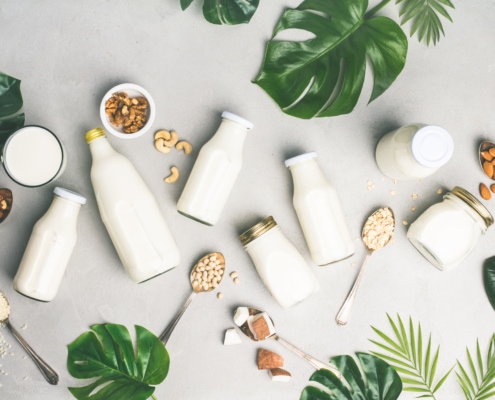 https://www.siamhillscoffee.com/wp-content/uploads/Great-Milk-Alternatives-–-Your-9-Best-Nondairy-Substitutes-for-Milk-–-1-scaled.jpg
1707
2560
Siamhillscoffee
https://www.siamhillscoffee.com/wp-content/uploads/coffee-logo.png
Siamhillscoffee2021-02-20 05:26:492021-03-03 10:47:18Great Milk Alternatives – Your 9 Best Nondairy Substitutes for Milk –
https://www.siamhillscoffee.com/wp-content/uploads/Great-Milk-Alternatives-–-Your-9-Best-Nondairy-Substitutes-for-Milk-–-1-scaled.jpg
1707
2560
Siamhillscoffee
https://www.siamhillscoffee.com/wp-content/uploads/coffee-logo.png
Siamhillscoffee2021-02-20 05:26:492021-03-03 10:47:18Great Milk Alternatives – Your 9 Best Nondairy Substitutes for Milk – https://www.siamhillscoffee.com/wp-content/uploads/Make-Your-Coffee-Healthy-–-Best-10-Ways-For-A-Better-Coffee-Experience-–-1.jpg
1414
2121
Siamhillscoffee
https://www.siamhillscoffee.com/wp-content/uploads/coffee-logo.png
Siamhillscoffee2021-02-12 08:13:182021-03-03 10:57:16Make Your Coffee Healthy – Best 10 Ways For A Better Coffee Experience –
https://www.siamhillscoffee.com/wp-content/uploads/Make-Your-Coffee-Healthy-–-Best-10-Ways-For-A-Better-Coffee-Experience-–-1.jpg
1414
2121
Siamhillscoffee
https://www.siamhillscoffee.com/wp-content/uploads/coffee-logo.png
Siamhillscoffee2021-02-12 08:13:182021-03-03 10:57:16Make Your Coffee Healthy – Best 10 Ways For A Better Coffee Experience – https://www.siamhillscoffee.com/wp-content/uploads/10-Best-Ways-to-Eat-Less-Sugar-–-How-to-Cut-Down-on-Sugar-–-1-scaled.jpg
1709
2560
Siamhillscoffee
https://www.siamhillscoffee.com/wp-content/uploads/coffee-logo.png
Siamhillscoffee2021-02-12 08:07:142021-03-03 10:58:4810 Best Ways to Eat Less Sugar – How to Cut Down on Sugar –
https://www.siamhillscoffee.com/wp-content/uploads/10-Best-Ways-to-Eat-Less-Sugar-–-How-to-Cut-Down-on-Sugar-–-1-scaled.jpg
1709
2560
Siamhillscoffee
https://www.siamhillscoffee.com/wp-content/uploads/coffee-logo.png
Siamhillscoffee2021-02-12 08:07:142021-03-03 10:58:4810 Best Ways to Eat Less Sugar – How to Cut Down on Sugar – https://www.siamhillscoffee.com/wp-content/uploads/Decaf-Coffee-–-Is-Decaffeinated-Coffee-Good-or-Bad-–-1.jpg
1415
2120
Siamhillscoffee
https://www.siamhillscoffee.com/wp-content/uploads/coffee-logo.png
Siamhillscoffee2021-02-12 07:57:572021-03-03 11:01:42Decaf Coffee – Is Decaffeinated Coffee Good or Bad? –
https://www.siamhillscoffee.com/wp-content/uploads/Decaf-Coffee-–-Is-Decaffeinated-Coffee-Good-or-Bad-–-1.jpg
1415
2120
Siamhillscoffee
https://www.siamhillscoffee.com/wp-content/uploads/coffee-logo.png
Siamhillscoffee2021-02-12 07:57:572021-03-03 11:01:42Decaf Coffee – Is Decaffeinated Coffee Good or Bad? – https://www.siamhillscoffee.com/wp-content/uploads/Coffee-Acidity-–-Everything-You-Need-to-Know-–-1-scaled.jpg
1707
2560
Siamhillscoffee
https://www.siamhillscoffee.com/wp-content/uploads/coffee-logo.png
Siamhillscoffee2021-02-12 07:52:442021-03-03 11:02:58Coffee Acidity – Everything You Need to Know –
https://www.siamhillscoffee.com/wp-content/uploads/Coffee-Acidity-–-Everything-You-Need-to-Know-–-1-scaled.jpg
1707
2560
Siamhillscoffee
https://www.siamhillscoffee.com/wp-content/uploads/coffee-logo.png
Siamhillscoffee2021-02-12 07:52:442021-03-03 11:02:58Coffee Acidity – Everything You Need to Know –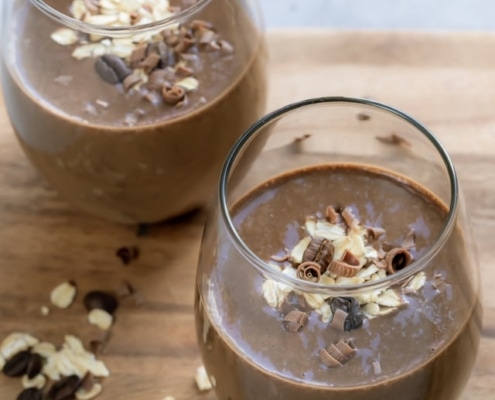 https://www.siamhillscoffee.com/wp-content/uploads/10-Best-Coffee-Protein-Shakes-–-Make-Your-Morning-Better-–-1.jpg
960
640
Siamhillscoffee
https://www.siamhillscoffee.com/wp-content/uploads/coffee-logo.png
Siamhillscoffee2021-02-12 07:48:282021-03-03 11:04:1910 Best Coffee Protein Shakes – Make Your Morning Better –
https://www.siamhillscoffee.com/wp-content/uploads/10-Best-Coffee-Protein-Shakes-–-Make-Your-Morning-Better-–-1.jpg
960
640
Siamhillscoffee
https://www.siamhillscoffee.com/wp-content/uploads/coffee-logo.png
Siamhillscoffee2021-02-12 07:48:282021-03-03 11:04:1910 Best Coffee Protein Shakes – Make Your Morning Better – https://www.siamhillscoffee.com/wp-content/uploads/We-Love-Coffee-–-10-Best-Reasons-Why-Coffee-is-Good-For-You-1-scaled.jpg
1707
2560
Siamhillscoffee
https://www.siamhillscoffee.com/wp-content/uploads/coffee-logo.png
Siamhillscoffee2021-02-12 07:43:082021-03-03 11:05:47We Love Coffee – 10 Best Reasons Why Coffee is Good For You –
https://www.siamhillscoffee.com/wp-content/uploads/We-Love-Coffee-–-10-Best-Reasons-Why-Coffee-is-Good-For-You-1-scaled.jpg
1707
2560
Siamhillscoffee
https://www.siamhillscoffee.com/wp-content/uploads/coffee-logo.png
Siamhillscoffee2021-02-12 07:43:082021-03-03 11:05:47We Love Coffee – 10 Best Reasons Why Coffee is Good For You – https://www.siamhillscoffee.com/wp-content/uploads/What-is-Chicory-Coffee-–-A-Healthy-Alternative-to-Coffee-or-Not-–-1-scaled.jpg
1747
2560
Siamhillscoffee
https://www.siamhillscoffee.com/wp-content/uploads/coffee-logo.png
Siamhillscoffee2021-02-12 07:37:062021-03-03 11:06:59What is Chicory Coffee? – A Healthy Alternative to Coffee or Not –
https://www.siamhillscoffee.com/wp-content/uploads/What-is-Chicory-Coffee-–-A-Healthy-Alternative-to-Coffee-or-Not-–-1-scaled.jpg
1747
2560
Siamhillscoffee
https://www.siamhillscoffee.com/wp-content/uploads/coffee-logo.png
Siamhillscoffee2021-02-12 07:37:062021-03-03 11:06:59What is Chicory Coffee? – A Healthy Alternative to Coffee or Not –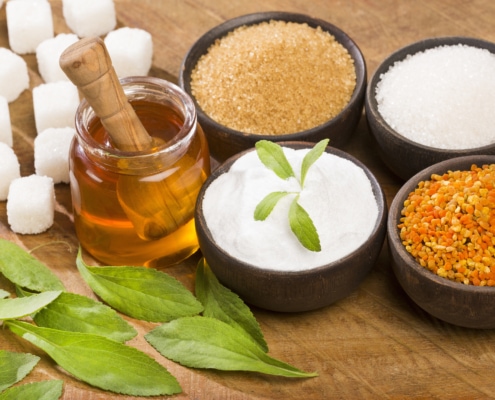 https://www.siamhillscoffee.com/wp-content/uploads/10-Best-Natural-Sugar-Substitutes-–-Your-Healthier-Sugar-Alternatives-to-Try-–-1-scaled.jpg
1707
2560
Siamhillscoffee
https://www.siamhillscoffee.com/wp-content/uploads/coffee-logo.png
Siamhillscoffee2021-02-12 07:32:372021-03-03 11:08:1810 Best Natural Sugar Substitutes – Your Healthier Sugar Alternatives to Try –
https://www.siamhillscoffee.com/wp-content/uploads/10-Best-Natural-Sugar-Substitutes-–-Your-Healthier-Sugar-Alternatives-to-Try-–-1-scaled.jpg
1707
2560
Siamhillscoffee
https://www.siamhillscoffee.com/wp-content/uploads/coffee-logo.png
Siamhillscoffee2021-02-12 07:32:372021-03-03 11:08:1810 Best Natural Sugar Substitutes – Your Healthier Sugar Alternatives to Try – https://www.siamhillscoffee.com/wp-content/uploads/Caffeine-Withdrawal-and-Headaches-–-7-Tips-for-Relief-and-More-–-1-scaled.jpg
1707
2560
Siamhillscoffee
https://www.siamhillscoffee.com/wp-content/uploads/coffee-logo.png
Siamhillscoffee2021-02-12 07:16:582021-03-03 11:12:51Caffeine Withdrawal and Headaches – 7 Tips for Relief and More –
https://www.siamhillscoffee.com/wp-content/uploads/Caffeine-Withdrawal-and-Headaches-–-7-Tips-for-Relief-and-More-–-1-scaled.jpg
1707
2560
Siamhillscoffee
https://www.siamhillscoffee.com/wp-content/uploads/coffee-logo.png
Siamhillscoffee2021-02-12 07:16:582021-03-03 11:12:51Caffeine Withdrawal and Headaches – 7 Tips for Relief and More – https://www.siamhillscoffee.com/wp-content/uploads/20-Best-Ground-Coffee-Recipes-9.jpg
896
640
Siamhillscoffee
https://www.siamhillscoffee.com/wp-content/uploads/coffee-logo.png
Siamhillscoffee2021-02-12 07:10:502021-03-03 11:14:2220 Best Ground Coffee Recipes – Make Delicious Food With Coffee –
https://www.siamhillscoffee.com/wp-content/uploads/20-Best-Ground-Coffee-Recipes-9.jpg
896
640
Siamhillscoffee
https://www.siamhillscoffee.com/wp-content/uploads/coffee-logo.png
Siamhillscoffee2021-02-12 07:10:502021-03-03 11:14:2220 Best Ground Coffee Recipes – Make Delicious Food With Coffee –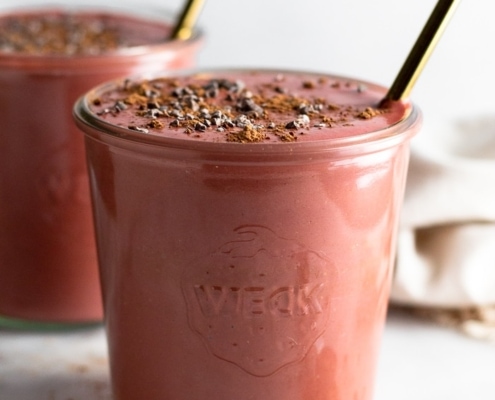 https://www.siamhillscoffee.com/wp-content/uploads/15-Great-Coffee-Breakfast-Smoothies-–-Simply-Delicious-Ways-to-Boost-Your-Morning-–14.jpg
1050
700
Siamhillscoffee
https://www.siamhillscoffee.com/wp-content/uploads/coffee-logo.png
Siamhillscoffee2021-02-12 06:52:492021-03-03 11:46:4615 Great Coffee Breakfast Smoothies – Delicious Ways to Boost Your Morning –
https://www.siamhillscoffee.com/wp-content/uploads/15-Great-Coffee-Breakfast-Smoothies-–-Simply-Delicious-Ways-to-Boost-Your-Morning-–14.jpg
1050
700
Siamhillscoffee
https://www.siamhillscoffee.com/wp-content/uploads/coffee-logo.png
Siamhillscoffee2021-02-12 06:52:492021-03-03 11:46:4615 Great Coffee Breakfast Smoothies – Delicious Ways to Boost Your Morning – https://www.siamhillscoffee.com/wp-content/uploads/Caffeine-Improves-Exercise-Performance-–-Does-Coffee-Make-Fit-–-1-scaled.jpg
1707
2560
Siamhillscoffee
https://www.siamhillscoffee.com/wp-content/uploads/coffee-logo.png
Siamhillscoffee2021-02-12 05:58:522021-03-03 11:49:58Caffeine Improves Exercise Performance – Does Coffee Make Fit? –
https://www.siamhillscoffee.com/wp-content/uploads/Caffeine-Improves-Exercise-Performance-–-Does-Coffee-Make-Fit-–-1-scaled.jpg
1707
2560
Siamhillscoffee
https://www.siamhillscoffee.com/wp-content/uploads/coffee-logo.png
Siamhillscoffee2021-02-12 05:58:522021-03-03 11:49:58Caffeine Improves Exercise Performance – Does Coffee Make Fit? – https://www.siamhillscoffee.com/wp-content/uploads/Is-Coffee-Addictive-–-A-Critical-Look-at-Coffee-and-Caffeine-–-1-scaled.jpg
1707
2560
Siamhillscoffee
https://www.siamhillscoffee.com/wp-content/uploads/coffee-logo.png
Siamhillscoffee2021-02-12 05:38:012021-03-03 11:55:00Is Coffee Addictive? – A Critical Look at Coffee and Caffeine –
https://www.siamhillscoffee.com/wp-content/uploads/Is-Coffee-Addictive-–-A-Critical-Look-at-Coffee-and-Caffeine-–-1-scaled.jpg
1707
2560
Siamhillscoffee
https://www.siamhillscoffee.com/wp-content/uploads/coffee-logo.png
Siamhillscoffee2021-02-12 05:38:012021-03-03 11:55:00Is Coffee Addictive? – A Critical Look at Coffee and Caffeine – https://www.siamhillscoffee.com/wp-content/uploads/Caffeine-and-Migraines-–-Does-Caffeine-Trigger-or-Treat-Migraines-–-2-scaled.jpg
1707
2560
Siamhillscoffee
https://www.siamhillscoffee.com/wp-content/uploads/coffee-logo.png
Siamhillscoffee2021-02-12 05:06:562021-03-03 12:03:40Caffeine and Migraines – Does Caffeine Trigger or Treat Migraines –
https://www.siamhillscoffee.com/wp-content/uploads/Caffeine-and-Migraines-–-Does-Caffeine-Trigger-or-Treat-Migraines-–-2-scaled.jpg
1707
2560
Siamhillscoffee
https://www.siamhillscoffee.com/wp-content/uploads/coffee-logo.png
Siamhillscoffee2021-02-12 05:06:562021-03-03 12:03:40Caffeine and Migraines – Does Caffeine Trigger or Treat Migraines – https://www.siamhillscoffee.com/wp-content/uploads/Caffeine-And-Your-Body-Everything-to-Know-About-Caffeine-Effects-–-2-scaled.jpg
1707
2560
Siamhillscoffee
https://www.siamhillscoffee.com/wp-content/uploads/coffee-logo.png
Siamhillscoffee2021-02-12 04:44:592021-03-03 12:09:01Caffeine And Your Body – Everything to Know About Caffeine Effects –
https://www.siamhillscoffee.com/wp-content/uploads/Caffeine-And-Your-Body-Everything-to-Know-About-Caffeine-Effects-–-2-scaled.jpg
1707
2560
Siamhillscoffee
https://www.siamhillscoffee.com/wp-content/uploads/coffee-logo.png
Siamhillscoffee2021-02-12 04:44:592021-03-03 12:09:01Caffeine And Your Body – Everything to Know About Caffeine Effects – https://www.siamhillscoffee.com/wp-content/uploads/How-To-Open-A-Coffee-Shop-The-10-Most-Important-Steps-1-scaled.jpg
1708
2560
Siamhillscoffee
https://www.siamhillscoffee.com/wp-content/uploads/coffee-logo.png
Siamhillscoffee2021-02-12 04:37:232021-03-03 12:10:33How To Open A Coffee Shop – The 10 Most Important Steps
https://www.siamhillscoffee.com/wp-content/uploads/How-To-Open-A-Coffee-Shop-The-10-Most-Important-Steps-1-scaled.jpg
1708
2560
Siamhillscoffee
https://www.siamhillscoffee.com/wp-content/uploads/coffee-logo.png
Siamhillscoffee2021-02-12 04:37:232021-03-03 12:10:33How To Open A Coffee Shop – The 10 Most Important Steps https://www.siamhillscoffee.com/wp-content/uploads/How-To-Sell-Coffee-Online-–-Open-Your-Own-Online-Coffee-Shop-1-scaled.jpg
1697
2560
Siamhillscoffee
https://www.siamhillscoffee.com/wp-content/uploads/coffee-logo.png
Siamhillscoffee2021-02-12 04:32:292021-03-03 12:12:06How To Sell Coffee Online – Open Your Own Online Coffee Shop
https://www.siamhillscoffee.com/wp-content/uploads/How-To-Sell-Coffee-Online-–-Open-Your-Own-Online-Coffee-Shop-1-scaled.jpg
1697
2560
Siamhillscoffee
https://www.siamhillscoffee.com/wp-content/uploads/coffee-logo.png
Siamhillscoffee2021-02-12 04:32:292021-03-03 12:12:06How To Sell Coffee Online – Open Your Own Online Coffee Shop https://www.siamhillscoffee.com/wp-content/uploads/Caffeine-and-Depression-Does-Caffeine-Help-with-Depression-–-1-scaled.jpg
1707
2560
Siamhillscoffee
https://www.siamhillscoffee.com/wp-content/uploads/coffee-logo.png
Siamhillscoffee2021-02-12 04:23:222021-03-03 12:13:42Caffeine and Depression – Does Caffeine Help with Depression? –
https://www.siamhillscoffee.com/wp-content/uploads/Caffeine-and-Depression-Does-Caffeine-Help-with-Depression-–-1-scaled.jpg
1707
2560
Siamhillscoffee
https://www.siamhillscoffee.com/wp-content/uploads/coffee-logo.png
Siamhillscoffee2021-02-12 04:23:222021-03-03 12:13:42Caffeine and Depression – Does Caffeine Help with Depression? – https://www.siamhillscoffee.com/wp-content/uploads/20-Best-Coffee-Dessert-Recipes-–-Your-Perfectly-Delicious-Coffee-Treat-–-1-scaled.jpg
1708
2560
Siamhillscoffee
https://www.siamhillscoffee.com/wp-content/uploads/coffee-logo.png
Siamhillscoffee2021-02-12 04:13:312021-03-03 12:17:1120 Best Coffee Dessert Recipes – Your Perfectly Delicious Coffee Treat –
https://www.siamhillscoffee.com/wp-content/uploads/20-Best-Coffee-Dessert-Recipes-–-Your-Perfectly-Delicious-Coffee-Treat-–-1-scaled.jpg
1708
2560
Siamhillscoffee
https://www.siamhillscoffee.com/wp-content/uploads/coffee-logo.png
Siamhillscoffee2021-02-12 04:13:312021-03-03 12:17:1120 Best Coffee Dessert Recipes – Your Perfectly Delicious Coffee Treat – https://www.siamhillscoffee.com/wp-content/uploads/Coffee-and-Caffeine-–-How-Much-Caffeine-is-Okay-for-You-–-1-scaled.jpg
1709
2560
Siamhillscoffee
https://www.siamhillscoffee.com/wp-content/uploads/coffee-logo.png
Siamhillscoffee2021-02-12 03:54:492021-03-03 12:25:58Coffee and Caffeine – How Much Caffeine is Okay for You? –
https://www.siamhillscoffee.com/wp-content/uploads/Coffee-and-Caffeine-–-How-Much-Caffeine-is-Okay-for-You-–-1-scaled.jpg
1709
2560
Siamhillscoffee
https://www.siamhillscoffee.com/wp-content/uploads/coffee-logo.png
Siamhillscoffee2021-02-12 03:54:492021-03-03 12:25:58Coffee and Caffeine – How Much Caffeine is Okay for You? – https://www.siamhillscoffee.com/wp-content/uploads/Make-Your-Coffee-Better-–-6-Fun-Ways-to-Boost-Your-Coffee-–-1-scaled.jpg
1709
2560
Siamhillscoffee
https://www.siamhillscoffee.com/wp-content/uploads/coffee-logo.png
Siamhillscoffee2021-02-12 03:45:112021-03-03 12:29:07Make Your Coffee Better – 6 Fun Ways to Boost Your Coffee –
https://www.siamhillscoffee.com/wp-content/uploads/Make-Your-Coffee-Better-–-6-Fun-Ways-to-Boost-Your-Coffee-–-1-scaled.jpg
1709
2560
Siamhillscoffee
https://www.siamhillscoffee.com/wp-content/uploads/coffee-logo.png
Siamhillscoffee2021-02-12 03:45:112021-03-03 12:29:07Make Your Coffee Better – 6 Fun Ways to Boost Your Coffee – https://www.siamhillscoffee.com/wp-content/uploads/Eating-Coffee-Beans-–-Yummy-Healthy-or-Stupid-–-1.jpg
1414
2121
Siamhillscoffee
https://www.siamhillscoffee.com/wp-content/uploads/coffee-logo.png
Siamhillscoffee2021-02-12 03:04:352021-03-03 12:37:32Eating Coffee Beans – Yummy, Healthy or Stupid –
https://www.siamhillscoffee.com/wp-content/uploads/Eating-Coffee-Beans-–-Yummy-Healthy-or-Stupid-–-1.jpg
1414
2121
Siamhillscoffee
https://www.siamhillscoffee.com/wp-content/uploads/coffee-logo.png
Siamhillscoffee2021-02-12 03:04:352021-03-03 12:37:32Eating Coffee Beans – Yummy, Healthy or Stupid – https://www.siamhillscoffee.com/wp-content/uploads/Caffeine-Side-Effects-–-10-Side-Effects-of-Too-Much-Caffeine-–-1.jpg
1414
2119
Siamhillscoffee
https://www.siamhillscoffee.com/wp-content/uploads/coffee-logo.png
Siamhillscoffee2021-02-12 02:58:352021-03-03 12:39:16Caffeine Side Effects – 10 Side Effects of Too Much Caffeine –
https://www.siamhillscoffee.com/wp-content/uploads/Caffeine-Side-Effects-–-10-Side-Effects-of-Too-Much-Caffeine-–-1.jpg
1414
2119
Siamhillscoffee
https://www.siamhillscoffee.com/wp-content/uploads/coffee-logo.png
Siamhillscoffee2021-02-12 02:58:352021-03-03 12:39:16Caffeine Side Effects – 10 Side Effects of Too Much Caffeine – https://www.siamhillscoffee.com/wp-content/uploads/A-Coffee-Journey-–-10-Steps-From-the-Seed-to-Your-Cup-–-1-scaled.jpg
1700
2560
Siamhillscoffee
https://www.siamhillscoffee.com/wp-content/uploads/coffee-logo.png
Siamhillscoffee2021-02-12 02:31:102021-02-20 14:09:30A Coffee Journey – 10 Steps From the Seed to Your Cup –
https://www.siamhillscoffee.com/wp-content/uploads/A-Coffee-Journey-–-10-Steps-From-the-Seed-to-Your-Cup-–-1-scaled.jpg
1700
2560
Siamhillscoffee
https://www.siamhillscoffee.com/wp-content/uploads/coffee-logo.png
Siamhillscoffee2021-02-12 02:31:102021-02-20 14:09:30A Coffee Journey – 10 Steps From the Seed to Your Cup – https://www.siamhillscoffee.com/wp-content/uploads/Coffee-Diet-–-Can-You-Really-Lose-Weight-With-Coffee-–-1-2-scaled.jpg
1708
2560
Siamhillscoffee
https://www.siamhillscoffee.com/wp-content/uploads/coffee-logo.png
Siamhillscoffee2021-02-12 02:07:232021-03-03 13:38:57Coffee Diet – Can You Really Lose Weight With Coffee? –
https://www.siamhillscoffee.com/wp-content/uploads/Coffee-Diet-–-Can-You-Really-Lose-Weight-With-Coffee-–-1-2-scaled.jpg
1708
2560
Siamhillscoffee
https://www.siamhillscoffee.com/wp-content/uploads/coffee-logo.png
Siamhillscoffee2021-02-12 02:07:232021-03-03 13:38:57Coffee Diet – Can You Really Lose Weight With Coffee? – https://www.siamhillscoffee.com/wp-content/uploads/10_reasons_to_drink_coffee_every_day.jpg
1414
2121
Siamhillscoffee
https://www.siamhillscoffee.com/wp-content/uploads/coffee-logo.png
Siamhillscoffee2019-11-05 07:26:292021-03-03 13:31:5310 Reasons to Drink Coffee Every Day
https://www.siamhillscoffee.com/wp-content/uploads/10_reasons_to_drink_coffee_every_day.jpg
1414
2121
Siamhillscoffee
https://www.siamhillscoffee.com/wp-content/uploads/coffee-logo.png
Siamhillscoffee2019-11-05 07:26:292021-03-03 13:31:5310 Reasons to Drink Coffee Every Day
